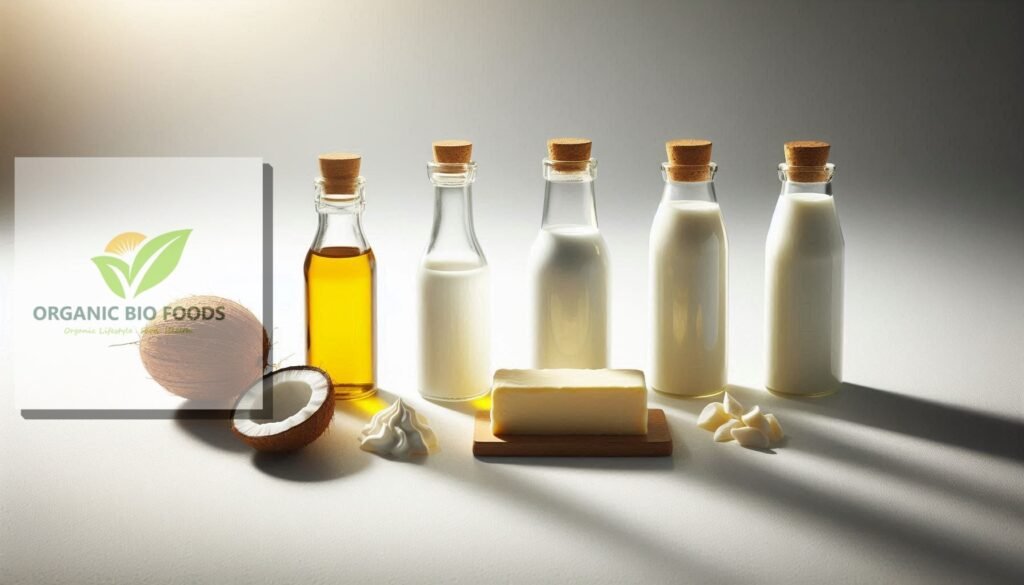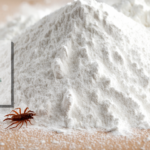Medium-Chain Triglycerides, commonly known as MCTs, have gained a lot of attention in recent years, especially among health enthusiasts. But what exactly are MCTs, and why are they so important? In this article, we’ll break down what MCTs are, why they’re good for you, and list five organic foods that naturally contain these beneficial fats.
What Are Medium-Chain Triglycerides (MCTs)?
Medium-Chain Triglycerides (MCTs) are a type of fat that are shorter in length compared to long-chain triglycerides (LCTs), which are more common in the typical diet. The “medium” in the name refers to the length of the fat molecule, which typically contains 6-12 carbon atoms. These fats are absorbed and metabolized differently from long-chain fats, making them a unique and beneficial energy source.
Unlike long-chain triglycerides, which take longer to digest and are more likely to be stored as fat, MCTs are rapidly absorbed by the liver. From there, they are quickly converted into energy or ketones, which can be an alternative energy source for the brain. This process makes MCTs a popular choice for people on a ketogenic diet or those looking to improve their energy levels and cognitive function.
Key Benefits of MCTs:
- Quick Energy Source: Because MCTs are rapidly absorbed and converted into energy, they can be an immediate fuel source, especially for athletes or individuals on a low-carb diet.
- Supports Weight Loss: Some studies suggest that MCTs may help promote weight loss by increasing feelings of fullness and boosting fat-burning. Research published in The Journal of Nutrition indicates that replacing LCTs with MCTs can lead to modest reductions in body weight and fat mass .
- Improves Cognitive Function: MCTs have been shown to produce ketones, which can serve as an alternative energy source for the brain. This is why MCTs are often included in brain health supplements.
- Supports Heart Health: While more research is needed, some studies suggest that MCTs may have a positive effect on cholesterol levels, reducing LDL (bad cholesterol) while increasing HDL (good cholesterol).
- Helps with Digestion: Since MCTs are easier to digest than long-chain fats, they are ideal for individuals with digestive issues or malabsorption disorders.
5 Organic Foods That Contain Medium-Chain Triglycerides
MCTs are commonly found in certain organic foods, particularly coconut and palm kernel oils. While many people rely on MCT oil supplements, you can also get MCTs from whole foods. Below are five organic foods rich in MCTs and how you can include them in your diet.
1. Organic Coconut Oil
Coconut oil is one of the richest natural sources of MCTs. About 60-65% of the fats in coconut oil are medium-chain triglycerides, primarily in the form of lauric acid. Lauric acid is a slower-digesting MCT, but it still provides some of the benefits associated with MCTs, such as quick energy and improved fat metabolism .
- Why Coconut Oil is Great: Coconut oil is versatile and can be used in cooking, baking, or even as a topping for salads. It’s also widely available in its organic form, making it an easy addition to a health-conscious diet.
- How to Use Coconut Oil: Try using organic coconut oil when cooking at medium heat, or add a spoonful to your morning coffee or smoothie for an extra energy boost.
2. Organic Palm Kernel Oil
Palm kernel oil is another rich source of MCTs, though it’s important to note that it is distinct from palm oil. Palm kernel oil comes from the seed of the palm fruit, and its MCT content is similar to that of coconut oil.
- Why Organic Palm Kernel Oil is Great: Palm kernel oil is another option for cooking, especially in high-heat settings due to its higher smoke point. When choosing palm kernel oil, be sure to look for organic and sustainably sourced options to avoid contributing to environmental harm.
- How to Use: Use palm kernel oil in frying or high-temperature cooking where coconut oil might not be stable. It can also be used as a butter substitute in some baking recipes.
3. Organic Full-Fat Dairy (Butter, Cheese, Yogurt)
Full-fat dairy products like butter, cheese, and yogurt naturally contain MCTs, particularly in the form of caproic, caprylic, and capric acids. While dairy doesn’t contain as high a percentage of MCTs as coconut oil, it’s still a good source, especially if you choose grass-fed, organic options.
- Why It’s Great: Organic full-fat dairy products are nutrient-dense and provide not only MCTs but also other important nutrients like calcium, vitamin D, and protein. Grass-fed dairy has higher levels of healthy fats, including omega-3s and conjugated linoleic acid (CLA), which may support heart health.
- How to Use: Incorporate organic full-fat yogurt or cheese into your snacks, or use organic butter for cooking and baking.
4. Organic Goat Milk
Like cow’s milk, goat milk contains MCTs, particularly in the form of caprylic and capric acids. These medium-chain fats are easier to digest than the longer-chain fats found in other dairy products, making goat milk a good option for people with digestive sensitivities .
- Why Organic Goat Milk is Great for people with digestive sensitivities: Goat milk has a slightly different nutrient profile than cow’s milk, with higher amounts of some vitamins and minerals. It’s also naturally lower in lactose, making it easier to digest for people with lactose intolerance.
- How to Use Organic Goat Milk: Drink organic goat milk on its own, or use it as a base for smoothies and creamy soups. You can also find goat milk yogurt and cheese for added variety in Health and Whole Food Supermarkets.
5. Organic Grass-Fed Ghee
Ghee is a form of clarified butter that is commonly used in Ayurvedic cooking. Like butter, ghee contains small amounts of MCTs, especially if it’s made from grass-fed organic cows. Ghee has a high smoke point, which makes it ideal for high-temperature cooking.
- Why It’s Great for people who are sensitive to dairy: Ghee is rich in fat-soluble vitamins like vitamin A, D, E, and K, making it a nutrient-dense cooking fat. It’s also lactose-free, which is helpful for those who are sensitive to dairy.
- How to Use: Use ghee in place of other oils for sautéing or frying. It adds a rich flavor to dishes and can even be used as a spread on bread or drizzled over vegetables.
Why Choose Organic Sources For MCT?
Opting for organic sources of these MCT-rich foods ensures that you’re not consuming harmful pesticides, chemicals, or additives. Organic farming practices also support environmental sustainability, making organic products a better choice for both your health and the planet.
According to The Organic Center, organic products are produced without synthetic fertilizers, pesticides, or genetically modified organisms (GMOs), which makes them a cleaner and healthier option for you and your family .
Final Thoughts
Medium-Chain Triglycerides (MCTs) offer a range of health benefits, from boosting energy and cognitive function to supporting weight loss and heart health. While many people rely on MCT oil supplements, you can also get MCTs from natural, organic food sources like coconut oil, palm kernel oil, full-fat dairy, goat milk, and grass-fed ghee.
Incorporating these organic foods into your diet is a simple and delicious way to reap the benefits of MCTs while supporting your overall health. By choosing organic, you’re not only nourishing your body but also contributing to a healthier planet. So, the next time you’re looking for a quick energy boost or a way to support your metabolism, reach for one of these MCT-rich organic foods.








